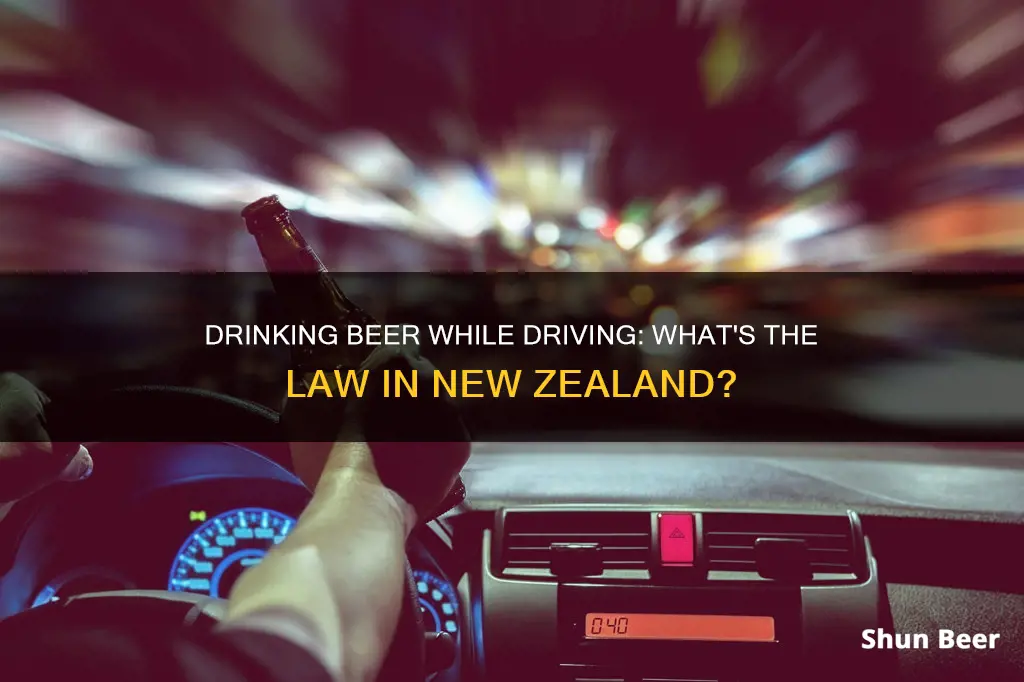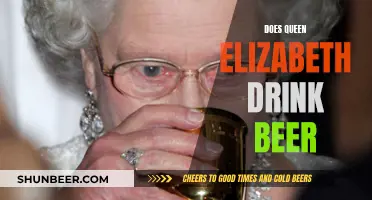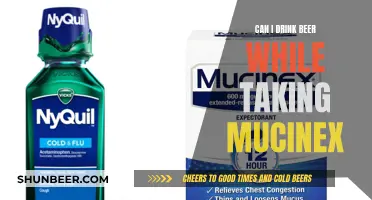
In New Zealand, it is legal for people aged 20 or more to drink beer while driving, as long as they do not exceed the legal alcohol limit. The alcohol limit for drivers aged 20 and over is 250 micrograms of alcohol per litre of breath, and the blood alcohol limit is 50 milligrams per 100 millilitres of blood. For those under 20, the alcohol limit for driving is zero. While drinking and driving is legal for those over 20, it is not recommended, as research indicates that driving ability is impaired after consuming any level of alcohol.
| Characteristics | Values |
|---|---|
| Legal alcohol limit for drivers 20 years and over | 250 micrograms of alcohol per litre of breath |
| Legal alcohol limit for drivers 20 years and over | 50 milligrams of alcohol per 100 millilitres of blood |
| Legal alcohol limit for drivers under 20 years | Zero |
| Fine for under 20s found with alcohol on their breath or in their blood | Up to $4,500 |
| Potential prison sentence for under 20s found with alcohol on their breath or in their blood | Up to three months |
What You'll Learn

Drinking and driving laws for under 20s
In New Zealand, it is legal for people aged 20 or more to drink alcohol while driving, as long as they do not exceed the legal limit. The legal alcohol limit for drivers aged 20 and over is a breath alcohol level of 250 micrograms per litre of breath or a blood alcohol level of 50 milligrams per 100 millilitres of blood.
However, the drinking and driving laws are much stricter for those under 20. The legal drink-drive limit for drivers under 20 is a blood alcohol concentration (BAC) of zero. This means that if you are under 20, any amount of alcohol in your breath or blood while driving is illegal.
There are three levels of penalties for under-20s driving over the alcohol limit, depending on how far over the limit they are:
- Infringement notice if under 150 mcg / 30 mg: If your breath alcohol level is between zero and 150 micrograms, or your blood alcohol level is between zero and 30 milligrams, you can be fined $200 on the spot and given demerit points. This does not result in a criminal record.
- Criminal charges if over 150 mcg / 30 mg: If your breath alcohol level is between 150 and 400 micrograms, or your blood alcohol level is between 30 and 80 milligrams, you can be prosecuted in court. If convicted, you may face up to three months' imprisonment, a fine of up to $2,250, and automatic disqualification from driving for at least three months, in addition to demerit points.
- Heavier criminal penalties if over 400 mcg / 80 mg: If your breath alcohol level is more than 400 micrograms, or your blood alcohol level is more than 80 milligrams, you may face up to three months' imprisonment, a fine of up to $4,500, and automatic disqualification from driving for at least six months. These penalties are the same as those for adult drivers.
It is important to note that even a small amount of alcohol can impair driving ability. Therefore, it is recommended to find alternative transportation if you plan on drinking, regardless of your age.
Invisalign and Beer: What You Need to Know
You may want to see also

Drinking and driving laws for over 20s
In New Zealand, drinking while driving is not illegal for those over 20, as long as the driver does not exceed the legal alcohol limit. The legal alcohol limit for drivers aged 20 and over is 250 micrograms of alcohol per litre of breath, and the blood alcohol limit is 50 milligrams per 100 millilitres of blood.
While it is not illegal to drink while driving for over 20s in New Zealand, it is still extremely dangerous and not recommended. Research indicates that driving ability is impaired even after consuming a small amount of alcohol. If you are going to drink, it is best to find an alternative way to get home rather than driving yourself.
The laws regarding drinking and driving in New Zealand are different for those under 20. For drivers under 20 years of age, the legal alcohol limit is zero. This means that any amount of alcohol detected on the breath or in the blood of an under-20 driver is illegal. Under-20s found with any alcohol on their breath or in their blood could face a fine of up to $4,500 and up to three months in prison, depending on the amount of alcohol found.
It is important to note that even if you are over the age of 20 and do not exceed the legal alcohol limit, drinking while driving can still impact your insurance coverage. Insurance companies may decline claims if they find that the driver had been drinking, even if they were under the legal limit. Additionally, lying about drinking to your insurance company can also result in a declined claim.
Exploring Alcohol Consumption on Folly Beach: Beer Included?
You may want to see also

Drinking and driving penalties
In New Zealand, there are strict penalties for drink-driving. The legal alcohol limits for drivers are age-related. If you are under 20, the alcohol limit for driving is zero. This means that if you are under 20 and drive after consuming even one drink, you can be charged with drink-driving. If your breath alcohol level is between zero and 150 micrograms per litre, or your blood alcohol level is between zero and 30 milligrams per 100 millilitres, you can be given an on-the-spot fine of $200 and 50 demerit points. If your alcohol level is higher, you may be prosecuted in court and, if convicted, imprisoned for up to three months, fined up to $2,250, and automatically disqualified from driving for at least three months.
For drivers aged 20 and over, the alcohol limit is 250 micrograms of alcohol per litre of breath or 50 milligrams of alcohol per 100 millilitres of blood. If your alcohol level is less than 150 micrograms per litre of breath or less than 30 milligrams per 100 millilitres of blood, you may be fined and given 50 demerit points. If your alcohol level is higher than the limit but less than 250 micrograms per litre of breath or 50 milligrams per 100 millilitres of blood, you can be given a $200 on-the-spot fine and 50 demerit points. If your alcohol level is between 251 and 400 micrograms per litre of breath or between 51 and 80 milligrams per 100 millilitres of blood, you may be fined and given 50 demerit points. If your alcohol level is higher than 400 micrograms per litre of breath or 80 milligrams per 100 millilitres of blood, you may be prosecuted in court. If convicted, you will be automatically disqualified from driving for at least six months and may be imprisoned or fined.
The penalties for drink-driving are more severe if you have previous drink-driving convictions or if you cause injury or death. If you commit two alcohol-related offences within a five-year period and one of those offences involves refusing to provide a breath or blood sample, driving under the influence, having a breath alcohol level above 1000 micrograms, or having a blood alcohol level above 200 milligrams per 100 millilitres, you may be disqualified from driving indefinitely and required to attend a Ministry of Health alcohol assessment centre.
Beer and Pepsi: A Match Made in Heaven?
You may want to see also

How drinking and driving is tested
In New Zealand, the legal blood alcohol limit for drivers aged 20 and over is 50 milligrams of alcohol per 100 millilitres of blood. For those under 20, the limit is zero. The breath alcohol limit for those 20 and over is 250 micrograms of alcohol per litre of breath.
The police can test drivers for alcohol at any time, without needing to suspect that the driver has been drinking. They use a series of tests to determine whether a driver is over the limit:
Passive Breath Test
The police officer will place a hand-held electronic device in front of the driver's mouth and ask them to talk. This device detects the presence of alcohol. If alcohol is detected, the officer will then require the driver to take a breath screening test.
Breath Screening Test
The driver blows into a mouthpiece attached to a small electronic device. This device provides a reading of the driver's breath alcohol level. If this reading is above the legal limit, the police will ask the driver to take an evidential breath test or have a blood test.
Evidential Breath Test
The driver blows into an electronic device, which gives a reading that can be used as evidence in court.
Evidential Blood Test
If the driver refuses or fails their evidential breath test, they can choose to have a blood test instead. This must be carried out by a medical doctor or other approved health professional.
In addition to these tests, the police can also require a compulsory impairment test if they suspect the driver is impaired by drugs. This includes an eye assessment, a walk and turn, and a one-leg stand assessment. If the driver fails this test, they may be forbidden to drive and required to take a blood test.
Beer and Colonoscopy: What You Can and Can't Drink Post-Procedure
You may want to see also

Alternatives to drinking and driving
In New Zealand, the legal alcohol limit for drivers aged 20 and over is 250 micrograms of alcohol per litre of breath, and the blood alcohol limit is 50 milligrams per 100 millilitres of blood. For those under 20, the limit is zero. While the law in NZ allows for drinking while driving, provided one does not exceed the legal limit, drinking any amount of alcohol impairs driving ability. Therefore, it is always best to make alternative plans to get home after drinking. Here are some safe alternatives to drinking and driving:
Ridesharing Services
Ridesharing services like Uber and Lyft offer a quick and efficient way to book a ride home after a night of drinking. These services are widely available in most urban and suburban areas and can be easily accessed through mobile apps. They provide convenience, safety, and transparency through features like driver ratings, ride tracking, and the ability to share trip details with contacts.
Designated Driver
Appointing a designated driver who refrains from drinking is a safe and economical option, especially for groups. It is important to choose a trustworthy person who can resist the temptation to consume alcohol and agree on a clear plan before the night begins. Ensure that the designated driver remains completely sober, as even small amounts of alcohol can impair judgment and reaction times.
Public Transportation
Taking advantage of public transportation, such as buses, trains, subways, or trams, is another alternative to drinking and driving. These options are usually available in most cities and offer extensive coverage. It is advisable to plan ahead, check schedules, and understand how to use public transportation to ensure a smooth journey home.
Taxi Services
Taxis have long been a reliable option for getting home safely after a night out. They are widely available, especially in urban areas, and can often be hailed on the street or booked in advance. Taxi drivers usually have extensive knowledge of the local area, enabling them to navigate efficiently.
Stay at a Friend's Place or Book a Nearby Hotel
Planning to stay at a friend's place or booking a nearby hotel can eliminate the need to drive after drinking. This option requires good communication and preparation, ensuring you have everything you need for the night. It is a comfortable and cost-effective solution that ensures a safe place to stay until you are sober.
Walk Home
If you live close enough and the weather permits, walking home can be a good alternative. However, those in colder climates should be cautious and ensure they can make it home safely, as winter conditions may be unsafe.
Breastfeeding After Drinking: How Long Should You Wait?
You may want to see also
Frequently asked questions
Drinking and driving is not illegal in New Zealand, but it is heavily advised against. If you are found to be over the drink-drive limit, you will be penalised.
The drink-drive limit in New Zealand is 250 micrograms of alcohol per litre of breath or 50 milligrams of alcohol per 100 millilitres of blood. If you are under 20, the limit is zero.
If you are found to be over the drink-drive limit, you could be fined and given 50 demerit points. If your alcohol level is higher, you could be disqualified from driving, imprisoned, or both.
There is no specific law against drinking alcohol in a stationary car, but if you are over the drink-drive limit and move the car, you will be penalised.







